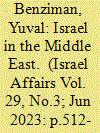| Srl | Item |
| 1 |
ID:
190986


|
|
|
|
|
| Summary/Abstract |
During its 75 years of existence, Israel’s strategies vis-à-vis its neighbours have alternated drastically in accordance with the vicissitudes in regional and global affairs: from reliance on force, to a status quo approach, to combining ‘land-for-peace’ approach while participating in ‘new wars’, to peace initiation, to unilateral action, to improved relations with the Arab world while trying to avoid the Palestinian issue. This article describes the evolution of these strategies, discusses their origin and underlying assumptions, and assesses their future implications.
|
|
|
|
|
|
|
|
|
|
|
|
|
|
|
|
| 2 |
ID:
123878


|
|
|
|
|
| Publication |
2013.
|
| Summary/Abstract |
Cultural texts take an important part in constructing a society's collective narrative. They play an even greater role in shaping the ethos of conflict and culture of conflict of societies enrolled in an ongoing conflict. The article focuses on Israeli films produced in the last three decades that deal with the Israel-Lebanon conflict. It is claimed that although criticizing the national narrative, these films also work to preserve and support it further. The movies are able to turn against the national narrative and require its continuation at the same time by framing the Lebanon situation as a one-time event that has ended, and isolating it from other aspects of the Israeli-Arab conflict; by forming soldier brotherhood unity; and by dissociating the soldiers' acts and their knowledge of the events from the conflict in which they take part. It is therefore claimed that, as opposed to the common scholarly perception that Israeli films abandoned their support of the national narrative in the late 1970s, they actually found new ways to preserve it.
|
|
|
|
|
|
|
|
|
|
|
|
|
|
|
|